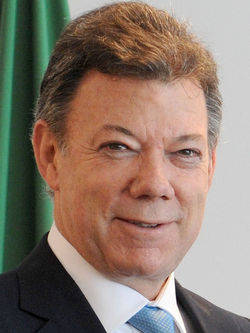
Juan Manuel Santos Calderón (Spanish: [ˈxwam maˈnwel ˈsantos kaldeˈɾon]; born 10 August 1951) is a Colombian politician who was the President of Colombia from 2010 to 2018. He was the sole recipient of the 2016 Nobel Peace Prize.
An economist by training and a journalist by trade, Santos is a member of the wealthy and influential Santos family, who from 1913 to 2007 were the majority shareholders of El Tiempo, Colombia's newspaper of record.
In 1991, Santos was appointed by President César Gaviria Trujillo as Colombia's first Minister of Foreign Trade. In 2000, he was appointed by President Andrés Pastrana Arango as the 64th Minister of Finance and Public Credit.
Santos rose to prominence during the administration of President Álvaro Uribe Vélez, who was elected in 2002. In 2005, Santos co-founded and led the Social Party of National Unity (Party of the U), a liberal-conservative party coalition that backed the policies of President Uribe, successfully supporting his attempt to seek a constitutional reform to be able to run for a second term. In 2006, after Uribe's re-election, when the Party of the U won a majority of seats in the two chambers of Congress, Santos was appointed as Minister of National Defence, and continued defending the security policies of President Uribe, taking a strong and forceful stance against FARC and the other guerrilla groups operating in Colombia. His time at the Ministry of Defense was tarnished by the "False positives" scandal, the executions of thousands of civilians that the army passed off as guerrillas killed in combat.
In 2010, Santos won the presidential election as the protégé of Uribe. Some months later, Uribe became his strongest opponent, and also founded three years later the opposition party Democratic Center. This rivalry determined both Santos' unpopularity and his near-missed defeat during the 2014 Colombian presidential election against Uribe's protégé Óscar Iván Zuluaga.
On 7 October 2016, Santos was announced as recipient of the Nobel Peace Prize for his efforts negotiating a peace treaty with the FARC-guerrilla in the country, despite his defeat in the referendum held over the deal, where the "No" campaign led by Uribe's Democratic Center won narrowly. The Colombian government and the FARC signed a revised peace deal on 24 November and sent it to Congress for ratification instead of conducting a second referendum. Both houses of Congress ratified the revised peace accord on 29–30 November 2016, marking an end to the conflict. The treaty brought deep divisions and polarization in the country, which questions its legitimacy. Santos has been named as one of Time's 100 most influential people. Santos left office with one of the lowest levels of popular approval ever, and his successor was Uribe's new protégé, Iván Duque, a moderate critic of Santos' peace treaty with the FARC guerillas.
Source : Wikipedia